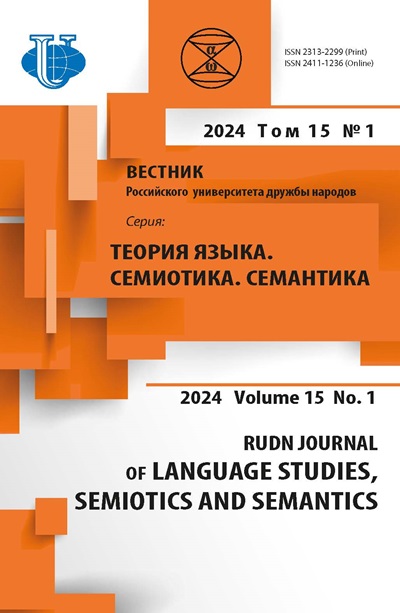NEOLOGISMS IN THE ENGLISH LANGUAGE IN THE 21ST CENTURY
- Authors: Koltsova E.A1
-
Affiliations:
- Ivanovo State Power Engineering University
- Issue: Vol 8, No 3 (2017)
- Pages: 604-613
- Section: Articles
- URL: https://journals.rudn.ru/semiotics-semantics/article/view/17021
- DOI: https://doi.org/10.22363/2313-2299-2017-8-3-604-613
Cite item
Full Text
Abstract
The article focuses on analysis of nominative processes and lexical change occurring in Eng-lish at the present stage of language development. Lexical system, being the most flexible and accessible, constantly evolves with the development of society embracing new lexical means and thus reflecting current social trends. New recently coined English words are the object of this article. The material included neologisms which have been added to oxford online dictionaries since 2010. Most of these lexical units have been selected for Oxford Word of the Year shortlists, compiled on the basis of their frequent use and significance in a particular year. A brief review of theoretical approaches to studying neologisms and the factors influencing their coinage is accompanied by comparative studies of statistical data conducted by linguists in late twentieth and early twenty-first centuries. This paper examines some distinctive characteristics of popular English neologisms and their actualization in everyday communication of native speakers of the English language. The research consisted of two stages: analytical, which included lexical analysis of neologisms, and interactive presenting an informant survey. A number of generalized thematic groups / functioning spheres have been identified in the semantic aspect during the initial stage. The degree of actual usage of these linguistic units by native English speakers has been determined in the survey of informants. The analysis of survey results has been performed and the attitude of native speakers to new and emerging words has been considered. An attempt has been made to reveal the underlying causes of the current changes and to propose an interpretation of the results received.
About the authors
Elena A Koltsova
Ivanovo State Power Engineering University
Email: elena.a.koltsova@gmail.com.
Koltsova Elena Aleksandrovna, PhD of Philology, Associate Professor of Intensive English Learning Department, Ivanovo State Power Engineering University; research interests: pragmatics, cognitive linguistics, linguistic manipulation 34, Rabfakovskaya Str., Ivanovo, Russia 153003
References
- Воейкова А.А. Особенности словообразования новой лексики в английском языке (на примере неологизмов, зафиксированных на Интернет-сайте www.wordspy.com) // Международный журнал прикладных и фундаментальных исследований. 2015. № 3. С. 119-122
- Гацалова Л.Б. Неология как наука в общей парадигме современного языкознания (на материале русского и осетинского языков): дис.. докт. филол. наук: Кабардино-Балкарский государственный университет имени Х.М. Бербекова. Нальчик, 2005.
- Левонтина И.Б. Язык как инструмент эволюции. Режим доступа: https://www.youtube.com/ watch?v=dfzCehnmHf8 Дата обращения: 27.03.2017.
- Algeo J. Fifty years among the new words: A dictionary of neologisms, 1941-1991. Cambridge: Cambridge University Press, 1991.
- Barnhart D.K. Prizes and pitfalls of computerized searching for new words for dictionaries // Dictionaries. 1985. no 7. pp. 253-260.
- Clayton D. Attitudes to language change and variation // Knowing about language: Linguistics and the secondary language classroom. London and New York: Routledge, 2016.
- Cook P.C. Exploiting linguistic knowledge to infer properties of neologisms: [dissertation]. Canada: University of Toronto, 2010.
- Metcalf A. Predicting New Words: The Secrets of Their Success. Boston, MA: Houghton Mifflin Company, 2004.
- Rets I. Teaching Neologisms in English as a Foreign Language Classroom // International Conference on Teaching and Learning English as an Additional Language, GlobELT 2016, 14-17 April 2016, Antalya, Turkey. Procedia: Social and Behavioral Sciences, 2016. no 232. pp. 813-820.
- The Telegraph. English language is changing faster than ever, research reveals. Режим доступа: http://www.telegraph.co.uk/news/newstopics/howaboutthat/11574196/new-forms-of-socialmedia-terms-which-parents-do-not-understand.html. Дата обращения: 27.03.2017.
- Urry J. Sociology beyond societies: Mobilities for the twenty-first century. London and New York: Routledge, 2012.













